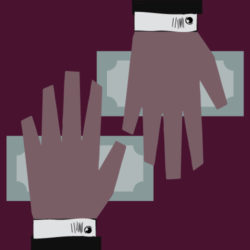Wagner boss Prigozhin bids for more power in Moscow
Thousands of anti-government protesters filled Prague’s Wenceslas Square on April 16 to demand the resignation of the Czech government. This is the second time in just over a month that a new Czech political party, with no seats in parliament, has brought people out onto the streets to show their anger at rising prices, for which it blames both the European Union and the governing coalition. For months now, the protestors have criticized the government’s attempt to criminalize disinformation, argued for the government to change its strong pro-Ukraine stance in the war with Russia and even called for Czechia to leave NATO. The protests are being lapped up by Russian state media outlets, which has made covering protests in Europe an editorial priority and an opportunity to spread disinformation. Recently, France has topped the headlines in Russia, with Dmitry Kiselyov, one of the Kremlin’s most prominent propagandists, expressing sympathy for protesters and criticizing French President Emanuel Macron for raising the state pension age to 64. Of course, Kiselyov did not mention Russia’s plan back in 2018 to raise the pension age to 65, which led to street protests and a significant drop in Russian President Vladimir Putin’s popularity. While Russian state media have devoted significant airtime to protests in France, they have almost completely ignored the passing into law of what is effectively a digital draft at home — a way, as my colleague Ellery Biddle wrote last week, for Russia to ensure that no eligible male can escape military service.
From Nigeria to Kenya, news outlets across the African continent celebrated Russia’s decision to cancel Africa’s $20 billion dollar debt. The news was announced by Vladimir Putin himself at an international parliamentary conference in Moscow titled “Russia-Africa in a multipolar world.” Putin also spoke about doubling trade with the continent and increasing the number of scholarships for African students to study in Russia. But it was the debt write off that grabbed the headlines. And that story is fake news, a classic piece of spin and disinformation piled upon a tiny kernel of truth from the distant past. Many of the African newsrooms that ran the story missed the fact that this debt has been written off many times before. The debt was owed to the Soviet Union when it collapsed in the 1990s. Since then, Russia, the self-appointed successor of the USSR on the global stage, has regularly relieved Africa of the burden of the debt it owes to a country that no longer exists. This piece by a Nigerian analyst puts together examples dating back over 20 years of Russian officials generously forgiving Africa’s debt. The number cited is always $20 billion and the fact that it is owed to the Soviet Union is never mentioned.
Russia’s charm offensive in Africa taps into the continent’s genuine disillusionment with the West, but it is based on false narratives and half-truths. Surprisingly, one person willing to call out the Kremlin on its duplicity is Yevgeny Prigozhin, the founder of the Wagner Group, a notorious private militia that is closely tied to the Russian state. The Wagner Group has an extensive presence in Africa, particularly in the Sahel region, which stretches west to east across the continent. While Putin has been promising a bright new dawn in Russia-Africa relations, Prigozhin has criticized Russian officials for being all talk and no action. “French and other players on the African continent are many times, ten times, hundreds of times more active than we are,” Prigozhin wrote on Telegram. Some suggest that Prigozhin, increasingly outspoken about the Kremlin’s failings, has political aspirations and wants to project himself as a statesman and potential leader of Russia.
PRIGOZHIN PLOTS POWER GRAB
By: Frankie Vetch
Last week, Yevgeny Prigozhin was reported to have been trying to secure control of a political party in Russia as part of his long-standing desire to acquire political power and presence in Moscow. The question is, will the Kremlin further enable the erratic, unpredictable owner of the Wagner Group of mercenaries?
Prigozhin doesn’t lack chutzpah. Last month, he wrote magnanimously to the U.S. Secretary of State, Antony Blinken, inviting him to “support Wagner PMC’s efforts in ensuring safety and security in Africa by sponsoring a new project named Wagner Safe Africa (WSA), in which you can invest, thereby saving American taxpayer money.” Yes, you read that correctly. The leader of an organization the U.S. has designated as a “significant transnational criminal organization” for its role in conducting mass executions, rape and child abductions in the Central African Republic and Mali has sent a request offering Washington the opportunity to invest in those very same operations.
Certainly, Prigozhin has been more successful in Africa than in Ukraine where the Wagner Group is fighting a long, bloody and costly battle over the eastern town of Bakhmut. A recent Bloomberg article indicated that he may be considering shifting his attention, and troops, away from Ukraine and toward Africa. Two confusing recent statements may be further evidence of his intentions. On April 7, he wrote about how Russia was far less active than the U.S. and France in Africa, arguing there was a need to change this. A week later, Prigozhin said the ideal option would be for Russia to end its invasion of Ukraine, claiming Russia had already achieved its goals.
In Africa, the Wagner Group functions as the Kremlin’s sword, providing military assistance where necessary, but also as the vanguard of Russian disinformation and propaganda. In December, my colleague Amanda Coakley and I wrote about how French-Beninese influencer Kemi Seba was helping to spread the Kremlin’s line on the war in Ukraine. A recent investigation conducted by several organizations, including the news outlet Jeune Afrique, uncovered just how deep the relationship between Prigozhin and Seba runs. The investigation reads like a script for a spy movie, with Seba assigned a designated handler, provided with lavish trips to Russia and paid thousands of dollars in return for spreading disinformation to his followers on social media, much of it designed to reinforce anti-French sentiments.
It is easy to see why many believe Russia’s approach is working. In October 2022, civilians and troops took to the streets waving Russian flags in Burkina Faso. By February, French troops were forced to leave Burkina Faso, after years of providing security, raising fears that, as had previously happened in Mali, Wagner mercenaries would fill the void. Anti-Western sentiments are growing. Last month, Burkina Faso suspended France’s state-owned international news channel, France 24.
“Russia has won in Africa,” one senior European diplomat, who did not want to be named, told my colleague Natalia Antelava. But Rida Lyammouri, from the Policy Center for the New South, a Morocco-based think tank, disagrees. He told me that despite the Wagner Group’s presence in Mali and Burkina Faso, its overall influence in the Sahel region is limited.
On a visit to Africa last month, U.S. Vice President Kamala Harris announced a $100 million investment in West African security. Many countries know that if they work with Wagner, they risk losing funding from the U.S., which recently tried to force Sudan and Libya to expel Wagner mercenaries. But, as conflict erupts in Sudan, it might have been too little too late. The Wagner Group has been in Sudan for years, allegedly mining Sudanese gold, which now helps to pay for the war in Ukraine. And, down the road, may help Prigozhin finance a bid for power in Moscow.
DON’T MISS:
- This piece from Meduza that looks at the life of Vladimir Kara-Muza, a Russian opposition politician who fought the Russian elite, survived two attempts on his life and has now been found guilty of treason and “spreading fake news” (read: condemning Russia’s war against Ukraine). Kara-Muza has been sentenced to 25 years in prison.
- This piece from Reuters on a new proposed government-backed fact checking unit in India that promises not to silence journalists.
WRITING TO EVAN GERSHKOVICH
Evan Gershkovich, our colleague from the Wall Street Journal, faces up to 20 years in prison on absurd espionage charges. Evan’s friends and colleagues are encouraging people from around the world to write to him in prison. Thank you to all the Disinfo Matters readers who have already done so. If you haven’t, please consider it. Evan is allowed to receive letters, although only in Russian. But you can email your message to [email protected] and it will be translated, printed out and mailed to the Moscow prison where Evan is spending two months in pre-trial detention.







